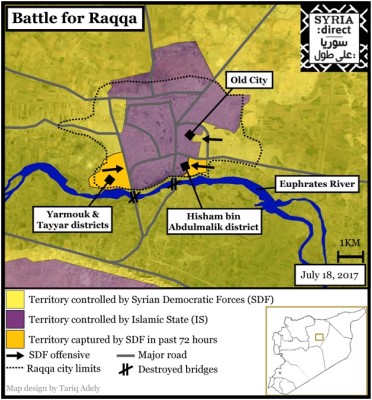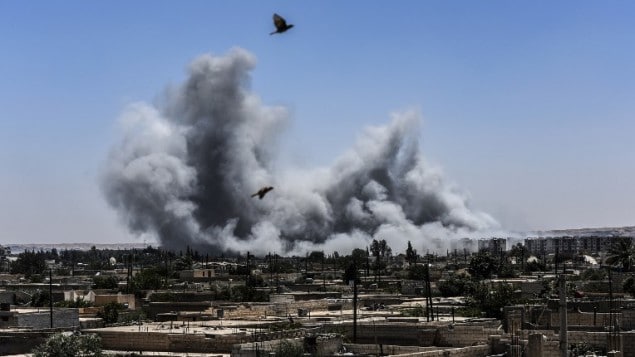US Central Command denies halt of offensive on Islamic State’s central Syrian position
LATEST
- Further Claims That Lebanese Army Tortured & Killed Detainees After Arsal Raid
- US Tries to Save Ceasefire in Southwest, Citing “Shared Goal” With Israel
- Detainees Write of Food Poisoning, Punishment in Homs Central Prison
- Regime Claims Capture of Oilfields from ISIS
The US has acknowledged numerous casualties in the Kurdish-led offensive on the Islamic State’s central position in Syria, the city of Raqqa, amid reports that the assault has slowed or even stopped.
Pentagon spokesman Jeff Davis said casualties are “absolutely” rising in the battle inside Raqqa, now in its sixth week. The Defense Department did not provide any figures.
Claims circulated earlier on Monday that the ISIS resistance had forced the US-backed Syrian Democratic Forces, led by the Kurdish militia YPG, to call off the offensive and return to a siege position. The US Central Command eventually denied the reports.
Despite official denials from coalition, local sources say SDF are reinforcing defences around Raqqa and re-evaluating tactics, after losses
— Quentin Sommerville (@sommervillebbc) July 17, 2017
An SDF commander appeared to confirm the claims: “The strategy has been changed to save civilian lives. We are fighting and advancing with great caution.” He said a reduction in the tempo of battles on the eastern front of the city would limit civilian casualties and preserve historic sites such as the Abbasid al-Atiq mosque in the heart of the Old City.
He also acknowledged ISIS resistance: “[Their] fortifications appear stronger.”
The SDF, whose offensive in Raqqa Province began in autumn 2016, finally entered the city from the east and west last month and cut off the southern route by taking the south bank of the Euphrates River. They captured several districts, and earlier this month they broke through the wall of the Old City. However, ISIS mines, improvised explosive devices, and snipers have pinned down the attackers in the past week.
Davis said on Monday, “We knew that Raqqa was going to be very hard. It’s a stop-and-go effort by its very nature.”
Backed by two dozen airstrikes, the SDF said it occupied almost a square mile of ground, including a high-rise complex, in a three-pronged advance over the weekend.

Map: Tariq Adely/Syria Direct
Meanwhile, Lahur Talabani, a senior Kurdish intelligence official in Iraq, said he believes ISIS leader Abu Bakr al-Baghdadi is still alive in Raqqa.
The Syrian Observatory for Human Rights, which often circulates rumor as fact, claimed recently that al-Baghdadi had been killed as Iraqi forces defeated ISIS in Iraq’s second city Mosul.
Davis maintained, “Militarily speaking, he’s largely irrelevant.”
Further Claims That Lebanese Army Tortured & Killed Detainees After Arsal Raid
Middle East Eye cites additional evidence that the Lebanese army tortured and killed four of the men detained after a raid on the Syrian refugee camps near Arsal, close to the Syrian border, at the end of June.
Lebanese authorities said the men died of natural causes after several days in custody. However, Middle East Eye says photographs show huge gashes and bruising on the bodies of three of the four men — Mustafa Abdel-Kareem Absi, Anas Hussein al-Hsaikeh, Khalid Hussein Moulays, and Othman Merhi Moulays.
The victims were tied with plastic handcuffs for days on end, “to the point where it caused extreme physical damage – on both their hands and legs”, said “a legal source who had seen the bodies”.
A second source with “extensive experience of examining images of torture victims” said the pictures showed “enough evidence of clear signs of torture”.
US Tries to Save Ceasefire in Southwest, Citing “Shared Goal” With Israel
Trying to preserve its ceasefire agreement with Russia over southwest Syria, the White House said on Monday that it has a “shared goal” with the Israelis in stopping a permanent Iranian presence in the area.
Press Secretary Sean Spicer issued the statement after Israeli Prime Minister Benjamin Netanyahu said on Sunday that Israel was “utterly opposed” to the arrangement near the Israeli-occupied Golan Heights.
There’s a shared interest that we have with Israel, making sure that Iran does not gain a foothold, military base-wise, in southern Syria. So while we’re going to continue those talks, obviously we want to have the productive ceasefire, but we also want to make sure that we’re not — one of our other objectives obviously remains to make sure that Iran does not gain a foothold in southern Syria. So we need to continue to have that discussion with Prime Minister Netanyahu about his concerns, but I think there is a shared goal there.
Throughout the Syrian conflict, Israel has carried out air and missile strikes to prevent the transfer of weapons to Iranian-backed Lebanese group Hezbollah and to ensure that no Iranian-Hezbollah position is established near the Golan border.
In the weeks before the US-Russia “de-escalation zone” was announced on July 9, the Israelis carried out three sets of strikes on Assad regime positions.
Detainees Write of Food Poisoning, Punishment in Homs Central Prison
Detainees in Homs Central Prison have sent an appeal, describing poor conditions and abuse.
In the letter, detainees wrote of food poisoning and said they had been threatened and punished after they proteested. They said the prison administration had blocked supplies of medicine:
The prison chief imposed new penalties, which threaten all detainees that any unacceptable deed they may do inside the prison will be a direct reason to drag the doer from prison to the buildings controlled by police….
Such a threat is a direct provocation by the chief of the prison, and this may cause a stir in the events….So will our appeal meet an appropriate respond?
We only want our freedom and no demand for us. Is such a requirement forbidden or is it a serious crime in the eyes of the state?
About 1,500 detainees are held in the prison. In 2015, the Assad regime suspended the transfer of any case to the judiciary and forbade the release of any prisoner except through a “settlement” with officials.
Regime Claims Capture of Oilfields from ISIS
The Assad regime’s military has claimed the capture of oilfields in northern Syria as the Islamic State retreats from long-held positions.
Alongside Iranian-backed foreign militias, the Syrian Arab Army claimed that it took the al-Daylaa oilfield in southwest Raqqa Province on Monday.
On Saturday, military spokesmen said they had occupied the Wahab, al-Fahd, Dbaysan, al-Qseer, Abu al-Qatat, and Abu Qatash oilfields.
At one point in the Syrian confict, the regime had lost 95% of oil and gas production. Kurdish forces still hold the other major area of oilfields, in northeastern Hasakah Province in northeast Syria near the Iraqi border.
Pro-Assad activists — contradicting the regime military’s claims — said the offensive had been checked at Sukhnah, to the south of the Raqqa oilfields and 18 km north of the Hail gas field, captured last week. State media said Russian warplanes are bombing the area.
Military source told me that the SAA's advance to Sukhnah is stalled for the most part. They reached the hills overlooking the city
— Abu Vladimir Al-Rusi (@leithfadel) 17 July 2017
The capture of Sukhna would open the way to Deir ez-Zor Province in eastern Syria, much of which is held by the Islamic State. Its fighters have pursued siege for almost three years against regime-held areas, including part of Deir ez-Zor city.

